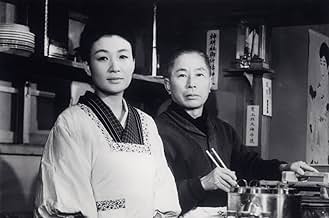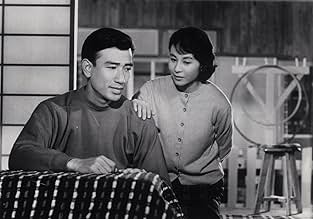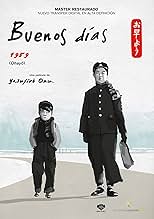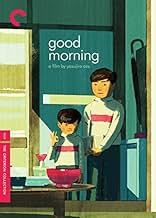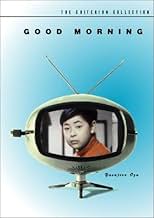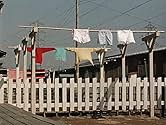NOTE IMDb
7,8/10
11 k
MA NOTE
Deux petits garçons commencent une grève du silence pour pousser leurs parents à leur acheter une télévision.Deux petits garçons commencent une grève du silence pour pousser leurs parents à leur acheter une télévision.Deux petits garçons commencent une grève du silence pour pousser leurs parents à leur acheter une télévision.
Histoire
Le saviez-vous
- AnecdotesYasujirô Ozu: [movie posters] Yasujirô Ozu pays tribute to his cinematic influences by putting all kinds of film posters all over the wall in his films. In this movie, there are two posters, one of La Chaîne (1958) (at 08:30) and one of Les amants (1958) (at 08:07), both at the neighbors' house.
- Versions alternativesThe original American theatrical release prints were in black and white.
- ConnexionsFeatured in Transcendental Style and Flatulence (2017)
Commentaire à la une
For viewers who have seen only one or two of Ozu's statelier films -- say, "Tokyo Story" or "Equinox Flower" -- "Good Morning" will be a surprise. Two children take a vow of silence to coerce their parents into buying a television set: that's pretty much the whole plot. But what happens as a result affects almost every aspect of life in the nondescript, gossipy, elbow-to-elbow suburb in which the boys' family lives.
This is a comedy, and like all good comedies it's very serious. The boys' act of rebellion is very un-Japanese, and it threatens many of the politely ritualistic social behaviors that mask and deflect the tensions in Japanese society. Whole alliances among the village's women teeter and threaten to topple. The family's authority structure is upended, with the all-powerful father crumbling against the stubborn silence of two little boys.
What wins in the end is love -- or rather (Ozu must have found this particularly funny) love and television. The resolution will probably tear you up (it has brought moisture to the eyes of everyone I've seen it with) but it represents enormous changes in Japanese society -- the collapse of patriarchal authority, the invasion of foreign culture, and especially English-language culture, and the inexorable rise of that great leveler of aesthetics, television. Ozu saw the future, and he wasn't in it.
So naturally, he presents all this in a gentle, even sweet-natured comedy. There may be greater Ozu films, but it's hard to think of one I actually like more than "Good Morning."
This is a comedy, and like all good comedies it's very serious. The boys' act of rebellion is very un-Japanese, and it threatens many of the politely ritualistic social behaviors that mask and deflect the tensions in Japanese society. Whole alliances among the village's women teeter and threaten to topple. The family's authority structure is upended, with the all-powerful father crumbling against the stubborn silence of two little boys.
What wins in the end is love -- or rather (Ozu must have found this particularly funny) love and television. The resolution will probably tear you up (it has brought moisture to the eyes of everyone I've seen it with) but it represents enormous changes in Japanese society -- the collapse of patriarchal authority, the invasion of foreign culture, and especially English-language culture, and the inexorable rise of that great leveler of aesthetics, television. Ozu saw the future, and he wasn't in it.
So naturally, he presents all this in a gentle, even sweet-natured comedy. There may be greater Ozu films, but it's hard to think of one I actually like more than "Good Morning."
Meilleurs choix
Connectez-vous pour évaluer et suivre la liste de favoris afin de recevoir des recommandations personnalisées
- How long is Good Morning?Alimenté par Alexa
Détails
Contribuer à cette page
Suggérer une modification ou ajouter du contenu manquant




